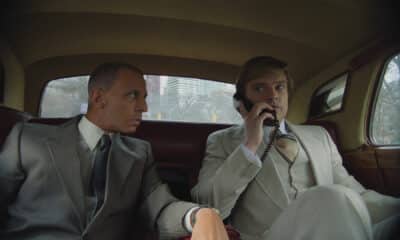Released to coincide with National Suicide Awareness week Last Call explores the psyche of one man, Scott (Dave Wilkins), whose desire to live rests on a knife edge. After a night of heavy drinking on the anniversary of an awful event, Scott decides he needs to call a Suicide Helpline. However, he dials the incorrect number and ends up on the phone with Beth (Sarah Booth), a night janitor and single mother who cleans at the local education centre. After the initial mix-up is cleared up, Beth realises that Scott is in dire need of help and sets out to do everything in her power to make sure Scott survives the night.

Written and directed by Gavin Michael Booth, Last Call is a gut-punching tale that highlights the all too real statistics of people dealing with thoughts of ending things. It tackles the subject in a mature and responsible way and manages to generate an awful amount of dread as the audience, alongside Beth, will Scott to be strong enough to tackle another day of living. The performances are brilliant, both actors are isolated from one another, only able to communicate across the telephone line, and yet they still manage to convey a genuine connection with one another. It must have been strange for them to exist in their own bubbles with no one to physically bounce off of during their scenes, but both dig deep and give compelling turns.
Wilkins handles his man-on-the-edge role well, managing to elicit empathy for his situation, but it’s Booth’s Beth that the audience truly bond with. Her performance sucks the viewer in and we go on the journey with her, and in doing so are placed in her shoes trying to rescue this complete stranger. We can all place ourselves into her shoes; what would we do if we received such a call? As we watch her choices unfurl on screen, the audience can either agree or disagree with what we are being shown, and think about how we may or may not do things differently.
Last Call also uses an interesting narrative method, with the film unfolding simultaneously across a split screen. The film was shot in real time across two locations, making it an example of two continuous single shots stitched together. Having both shots occurring on screen side-by-side means that we can always see both characters and have a view into their worlds. It helps to generate that closeness and intimacy between Scott and Beth that is lost by having them chat on the phone. A standard back and forth between two shots would have rendered the film tiresome. By offering up both screens at once there is always something for the viewer to look at, and it gives them the ability to decide whether they want to focus on the speaker or the listener at any given time. In the more traditional structure it would be the director that would dictate who we would watch and when, but by placing it into the viewer’s hands, it gives them an almost God-like omniscience that helps get into the minds of the characters.
Depression, suicidal impulses, and addiction are all cast into the spotlight during Last Call‘s runtime. These issues are still perceived as taboo topics within the medium of film and as such it’s encouraging to find a new voice open to illuminating them. Last Call throws these topics into focus, and does so in a considered and respectful manner. The film will, at times, cut a little too close for comfort for those that have lost anyone to suicide, but hopefully by exploring the topic on such a platform, more people that need help will decide to seek it out.
Last Call will be released on Digital HD on Friday 18th September 2020.
Last Call
Kat Hughes
Summary
An important scenario told through a dynamic narrative style, Last Call offers up a necessary dialogue on a topic that is all too often branded as taboo.
Kat Hughes is a UK born film critic and interviewer who has a passion for horror films. An editor for THN, Kat is also a Rotten Tomatoes Approved Critic. She has bylines with Ghouls Magazine, Arrow Video, Film Stories, Certified Forgotten and FILMHOUNDS and has had essays published in home entertainment releases by Vinegar Syndrome and Second Sight. When not writing about horror, Kat hosts micro podcast Movies with Mummy along with her five-year-old daughter.

Latest Posts
-


Film News
/ 7 days agoTrailer: Apple Original ‘The Gorge’ with Miles Teller and Anya Taylor-Joy
Apple Original Film The Gorge has just got itself a trailer ahead of a...
By Paul Heath -


Interviews
/ 2 weeks ago‘The Last Video Store’ Co-Director Tim Rutherford discusses the film
Co-directors Tim Rutherford and Cody Kennedy have spent a decade creating their feature debut,...
By Kat Hughes -


Film Festivals
/ 2 weeks ago‘The Last Video Store’ team Cody Kennedy, Josh Lenner & Kevin Martin discuss the journey of their film
Having debuted in the UK at 2023’s FrightFest Halloween, it has taken a little...
By Kat Hughes -


Home Entertainment
/ 2 weeks ago‘Strange Darling’ UHD review: Dir. JT Mollner
THN first caught JT Mollner’s Strange Darling back in 2023 as part of Fantastic...
By Kat Hughes













